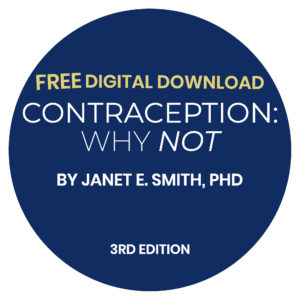Fr. Anthony Percy at the Marriage Resource Centre offers additional commentary on Professor Janet E. Smith’s translation of Humanae Vitae.
From the article: “This translation is provided from the Latin text by Janet E. Smith. One minor change to Smith’s text and some formatting changes were provided by Father Anthony Percy to enable ease of reading.
This translation of Humanae Vitae is noteworthy, since by providing a more accurate translation of the original Latin text, it enables the reader to understand the full import of the teaching given by Pope Paul VI. This is true in a number of areas in the encyclical if you compare it closely with other older English translations. Two areas are of special note.
Marriage as ‘Munus’
First, note the constant use of the Latin word munus to describe the vocation and mission of married people in the Church and world. It is normally translated in theology as office.
For instance, we say the priesthood of Jesus Christ has a threefold munera. The presbyter is priest, prophet and king. He has the office and task of sanctifying, preaching and teaching, and governing. It is significant, therefore, that this rich theological word, and the reality that it mediates, is used for married couples in their vocation of conjugal love.
The repeated use of munus in Humanae Vitae alerts us to the gift, duty, office, responsibility and service that marriage is, in and through, the mystical Body of Christ.
Conscious Parenthood
Second, aligned to this truth is the phrase conscious parenthood. This phrase is used repeatedly by Paul VI in Humanae Vitae. Initial translations into English rendered the Latin phrase as responsible parenthood. Yet, as Smith demonstrates clearly in her translation, conscious parenthood is a far more accurate rendering of the Latin text.
Smith has written at length about the importance of the phrase conscious parenthood (Cf. Nova et Vetera, English Edition, Vol. 6, No.4 (2008): 927-950). She notes that the phrase has its origins in the thought of Karol Wojtyla (Pope John Paul II) who had significant input into the construction of Humanae Vitae.
Wojtyla wrote of conscious parenthood in Love and Responsibility (1960). “Love and parenthood” he wrote, “must not therefore be separated from the other. Willingness for parenthood is an indispensable condition of love” (p. 236). This particular insight, that sexuality is intimately tied up with parenthood, has gone unnoticed by many, at least as far as I am aware.
With respect to sexuality and the conjugal act, attention has been focused on the unitive and procreative dimensions. This is not surprising, since Paul VI did emphasize the inseparability of the two. However, with a more accurate translation of Humanae Vitae, it is now possible to see that Paul VI was no less concerned with the parental value of the sex-act. And it is this insight that is worth our consideration.
Just prior to Wojtyla’s words about willingness for parenthood as an indispensable condition for love (cited above) he made this startling statement: “Man must reconcile himself to his natural greatness.”
In other words, man must become conscious of his profound dignity, which includes his gift of human sexuality. Wojtyla continues:
It is especially when he enters so deeply into the natural order, immerses himself so to speak in its elemental processes, that he must not forget he is a person. Instinct alone can resolve none of his problems, everything demands decisions from his ‘interior self,’ his reason and his sense of responsibility.
It is clear, then, that we are not simply dealing with a purely intellectual consciousness or a merely formal moral consciousness. The intellect and will are clearly not excluded, but the reference to the ‘interior self’ is alerting us to a deeply personal view of consciousness.
Smith notes this precise point when she recounts her discussions with a Polish academic who informed her that the Polish word that is translated as conscious throughout Love and Responsibility:
[C]onnotes a deeply personalistic meaning; it means being vividly aware of some reality; it conveys experiencing something with one’s emotions as well as one’s intellect.
When, therefore, Wojtyla speaks of man being reconciled to his natural greatness, what is intended is an experience of truth as value – of value for me, of value for us, of value for society, etc. We not only come into the truth mentally and intellectually, but we come to experience the truth as good for us. The experience is such that we desire the truth with our entire being.
That is, I encounter the objective truth as my truth. That is, the truth becomes who I am. That is, the truth in all its beauty and goodness becomes the foundation of my life. That is, the truth sets me free (Cf. John 8, 32). When this point has arrived, I have become conscious of the truth. This is what Wojtyla intends by the word ‘conscious.’
Smith, for her part, puts is succinctly and neatly, when she writes in her article Conscious Parenthood:
Man’s dignity resides not only in his ability to know the truth and to live by it, but also in his ability to recognize the goodness of the truth. He, in his subjectivity, must make objective truth his own (p. 928. My emphasis.)
So, conscious parenthood is a profound human experience – intellectual, moral, emotional, physical, spiritual – whereby one becomes aware of the dignity of the possibility and/or reality of parenthood.
With these thoughts, we can say that the encyclical is primarily concerned about conscious parenthood. This is its real hermeneutic. Sexual values spring from the fountain of parenthood and one can make a clear judgment about the morality of contraceptive acts from this viewpoint.”
To continue reading, click the following link:
https://marriageresourcecentre.org/a-rich-new-translation-of-humanae-vitae/



Leave a Reply